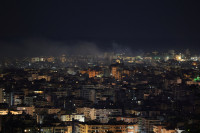World
Ukrainian man arrested over Nord Stream pipeline attacks
Russia launched a full-scale invasion of Ukraine in February 2022, triggering Europe's deadliest conflict in 80 years.
Reuters
A Ukrainian man has been arrested in Italy on suspicion of coordinating the 2022 attacks on the Nord Stream gas pipelines, German prosecutors said on Thursday, marking a breakthrough in an episode that sharpened tensions between Russia and the West.
Seen by both Moscow and the West as an act of sabotage, the explosions severely damaged three pipelines carrying gas from Russia to Europe, prompting a major escalation in the Ukraine conflict and squeezing energy supplies on the continent. No one has ever taken responsibility for the blasts.
The arrest comes just as Kyiv is engaged in fraught diplomatic discussions with the United States over how to end the war in Ukraine without giving away major concessions and swathes of its own territory to Russia.
Successive Ukrainian governments had seen the pipelines as a symbol of, and vehicle for, Russia's hold over European energy supplies that Kyiv argued made it hard to act against Moscow ever since Russia's annexation of Crimea in 2014.
Russia launched a full-scale invasion of Ukraine in February 2022, triggering Europe's deadliest conflict in 80 years, in which analysts say more than 1 million people have been killed or injured.
"The bombing of the pipelines must be investigated, including through criminal prosecution. Therefore, it is good that we are making progress in this regard," said German Justice Minister Stefanie Hubig in a statement.
An official in the Ukrainian president's office said he could not comment as it was not clear who had been arrested. The official reiterated Ukraine's denial of any role in the blasts.
The suspect, identified only as Serhii K. under German privacy laws, was part of a group of people who planted devices on the pipelines near the Danish island of Bornholm in the Baltic Sea, a statement from the prosecutor's office said.
He and his accomplices had set off from Rostock on Germany's northeastern coast in a sailing yacht to carry out the attack, it said. The vessel had been rented from a German company with the help of forged identity documents via middlemen, it added.
Authorities acted on a European arrest warrant for the suspect, who faces charges of collusion to cause an explosion, anti-constitutional sabotage and destruction of important structures.
Carabinieri officers arrested him overnight in the province of Rimini on Italy's Adriatic coast, the German prosecutors' statement said.
The Italian Carabinieri confirmed the arrest and said the suspect was aged 49 but gave no further details.
MYSTERIOUS BLASTS
In September 2022, one of the two lines of the Nord Stream 2 pipeline was damaged by mysterious blasts, along with both lines of Nord Stream 1 that carried Russian gas to Europe.
Both the US and Ukraine have denied having anything to do with the attacks, as has Russia. Moscow, without providing evidence, blamed Western sabotage for the blasts, which largely severed Russian gas supplies to the lucrative European market.
Denmark and Sweden closed their investigations in February 2024, leaving Germany as the only country continuing to pursue the case.
Danish authorities concluded there was "deliberate sabotage of the gas pipelines" but found "insufficient grounds to pursue a criminal case", while Sweden closed its investigation citing a lack of jurisdiction.
The Washington Post and Germany's Der Spiegel magazine have previously said the team that carried out the attack was put together by a former Ukrainian intelligence officer, who has denied involvement.
In January 2023, Germany raided a ship that it said may have been used to transport explosives and told the United Nations it believed trained divers could have attached devices to the pipelines at about 70 to 80 metres deep.
The boat, leased in Germany via a Poland-registered company, contained traces of octogen, the same explosive that was found at the underwater blast sites, according to the investigations by Germany, Denmark and Sweden.
German media reported last year that Germany had issued a European arrest warrant against a Ukrainian diving instructor who allegedly was part of the team that blew up the pipelines.
Citing unnamed sources, several outlets reported that German investigators believed the man, last known to have lived in Poland, was one of the divers who planted explosive devices on the pipelines.




 9.7°C Kathmandu
9.7°C Kathmandu














